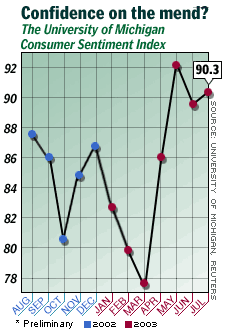NEW YORK (CNN/Money) -
A closely watched measure of consumer confidence in the United States rose slightly in July, according to a published report Friday, which hinted that consumers, the backbone of the world's largest economy, are worried about a prolonged slump in the labor market.
The University of Michigan's consumer sentiment index rose to 90.3 from 89.7 in June, according to market sources quoted by Reuters. Economists, on average, expected a reading of 90, according to a Reuters poll.

The "current conditions" component of the index, which measures how consumers feel about their present situation, rose to 102.8 from 94.7, Reuters said.
But the "expectations" component of the index, which measures how consumers think the economy will perform in the next 12 months, fell to 82.7 from 86.4 in June, according to the report.
"Interest rates are low, the stock market is higher, and we hear all this talk about a tax-cut package," said Lara Rhame, economist at Brown Brothers Harriman, listing the possible reasons for a rise in the "current conditions" index. "But there's one looming negative, which is a very discouraging jobs picture."
The news had little impact on U.S. stock prices, which were mixed in early trading. Treasury bond prices were mostly lower.
Wall Street pays close attention to consumers, whose spending makes up more than two-thirds of all U.S. economic activity.
Consumer sentiment rebounded in April and May, after a big slide in the walk-up to the U.S.-led war with Iraq, and most economists hoped it pointed the way to better overall economic performance in the second half of the year.
But a sluggish labor market contributed to a drop in confidence in June, and July's slight gain did little to change the idea that consumers are still wary about the economy's prospects.
The U.S. unemployment rate rose to 6.4 percent in July, the highest level since April 1994, and there's been no net job creation in U.S. payrolls for more than two years, the longest such slump since World War II.
Reinforcing the idea that consumers are growing impatient for jobs growth, the ABC/Money magazine weekly poll of consumer sentiment has also fallen in recent weeks.
| Related stories
|

|
|
|
|
"I firmly believe consumer spending will stay in positive territory, but I think we will see further signs of consumer fatigue as the year progresses," Rhame said.
Economists usually take consumer confidence measures with a grain of salt; they don't always paint an accurate picture of how consumers will spend. Consumer sentiment plunged after the Sept. 11, 2001, terror attacks, for example, but consumers kept on spending.
Nevertheless, most economists believe the labor market will have to improve, encouraging stronger wage growth, before consumer confidence and the economy will fully recover -- and it could be several months before companies start hiring again.
"Nothing is going to happen in terms of improving confidence until something happens in terms of an improving labor market, and that might well take until after New Year's," said Ken Goldstein, economist at the Conference Board, a private research firm that publishes its own monthly survey of consumer confidence.
"Given that we're at least a couple of months away from turnaround in the labor market, the fact that consumer confidence is not doing much worse than treading water is actually a good-news story," Goldstein said.

|

